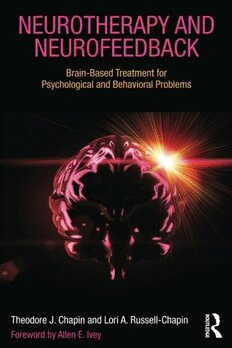
Neurotherapy and Neurofeedback: Brain-Based Treatment for Psychological and Behavioral Problems PDF
Preview Neurotherapy and Neurofeedback: Brain-Based Treatment for Psychological and Behavioral Problems
Neurotherapy and Neurofeedback The fields of neurobiology and neuropsychology are growing rapidly, and neuroscientists now understand that the human brain has the capability to adapt and develop new living neurons by engaging new tasks and challenges throughout our lives, essentially allowing the brain to rewire itself. In Neurotherapy and Neurofeedback, accomplished clinicians and scholars Ted Chapin and Lori Russell-Chapin illustrate the importance of these advances and introduce counselors to the growing body of research demonstrating that the brain can be taught to self-regulate and become more efficient through neurofeedback (NF), a type of biofeedback for the brain. Students and clinicians will come away from this book with a strong sense of how brain dysregulation occurs and what kinds of interventions clinicians can use when counseling and medication prove insufficient for treating behav- ioral and psychological symptoms. Theodore J. Chapin, PhD, teaches courses on divorce, family mediation, and group therapy. He serves as the president and clinical director of Resource Management Services, Inc., a private business consulting and counseling firm. Dr. Chapin is an expert in custody evaluations and has written widely about neurofeedback, mediation, and clinical supervision, most recently in Clinical Supervision: Theory and Practice, which he co-authored with Dr. Russell-Chapin. Lori A. Russell-Chapin, PhD, is a professor and associate dean of the College of Education and Health Sciences at Bradley University in Peoria, Illinois. She is also the co-director of the Center for Collaborative Brain Research at Bradley University, where she facilitates collaborative research in the areas of cognitive research, brain imaging, and neural feedback. In 2013, she was the recipient of the national Linda Seligman Counselor Educator of the Year Award, and she currently maintains a private counseling practice and is the co-author of six books, including Clinical Supervision: Theory and Practice. This page intentionally left blank Neurotherapy and Neurofeedback Brain-Based Treatment for Psychological and Behavioral Problems Theodore J. Chapin and Lori A. Russell-Chapin First published 2014 by Routledge 711 Third Avenue, New York, NY 10017 and by Routledge 27 Church Road, Hove, East Sussex BN3 2FA © 2014 Theodore J. Chapin & Lori A. Russell-Chapin Routledge is an imprint of the Taylor & Francis Group, an informal business. The right of Theodore J. Chapin and Lori A. Russell-Chapin to be identified as authors of this work has been asserted by them in accordance with sections 77 and 78 of the Copyright, Designs and Patents Act 1988. All rights reserved. No part of this book may be reprinted or reproduced or utilized in any form or by any electronic, mechanical, or other means, now known or hereafter invented, including photocopying and recording, or in any information storage or retrieval system, without permission in writing from the publishers. Trademark Notice: Product or corporate names may be trademarks or registered trademarks, and are used only for identification and explanation without intent to infringe. Library of Congress Cataloging-in-Publication Data Chapin, Theodore J. Neurotherapy and neurofeedback : brain-based treatment for psychological and behavioral problems / Theodore J. Chapin and Lori A. Russell-Chapin. pages cm Includes bibliographical references and index. 1. Biofeedback training. 2. Mental health. 3. Neuropsychology. 4. Neuropsychiatry. I. Chapin, Ted. II. Title. BF319.5.B5R87 2014 615.8'514—dc23 2013023602 ISBN: 978-0-415-66223-9 (hbk) ISBN: 978-0-415-66224-6 (pbk) ISBN: 978-0-203-07252-3 (ebk) Typeset in Abode Caslon by Apex CoVantage, LLC This book is dedicated to everyone who fi nds the human brain fascinating. Neurofeedback has made such a difference in many people’s lives. Thank you to our children, Elissa and Jaimeson, who trusted us enough to allow neurofeedback into their lives. This page intentionally left blank CONTENTS Foreword ix Allen E. Ivey 1 Introduction to Neurotherapy and Neurofeedback 1 2 The History of Neurotherapy 12 3 Sources of Brain Dysregulation 20 4 The Neurophysiology of Self-Regulation 54 5 Strategies for Self-Regulation 68 6 Basic Concepts and Principles in Neurofeedback 87 7 Assessment, Treatment Planning, and Outcome Evaluation 109 8 Neurofeedback Training, Protocols, and Case Studies 132 9 Neurofeedback Effi cacy Research 167 1 0 The Future of Neurotherapy and Other Professional Issues 200 Index 211 vii This page intentionally left blank FOREWORD After reading, I am shamelessly impressed by the scholarly and creative work of Drs. Lori Russell-Chapin and Ted Chapin. This book offers both the basics of neurofeedback and, equally important, a superb summary of current discoveries on the brain and neuroscience research. While oriented to those interested in neurofeedback, it is also an ideal introduction to brain basics for anyone who wishes to bring science into counseling and psychotherapy. Neurofeedback’s history goes back to 1924, when the German psychiatrist Hans Berger attached electrodes to the scalp and detected small currents in the brain. His research became the foundation for what is occurring today. In the 1960s, Joe Kamiya brought neurofeedback into more popular attention through his pioneering study of alpha brainwaves. It has taken some time, but now more sophisticated equipment at a reasonable price for what it provides has made neurofeedback and neurotherapy available to professionals and to the lay public. The Chapins’ book is also pioneering, even seminal, in several ways. First, it defi nes and summarizes the nature of neurofeedback clearly and succinctly. Next, it is the fi rst book that brings together neuroscience as the foundation of neurotherapy. The defi nition of neuroscience is wisely broad, as neuroscience is the most integrative of all science disciplines. In this book, you will discover a raft of implications for neuroscience and neurofeedback. Among these are how diet and exercise impact the brain and the importance of Bowlby’s attachment theory as a central aspect of neuroscience, as well as many brain basics. I could go on at great length reviewing and discussing each chapter. For those who want to learn essentials of neurofeedback, you may want to start by reading C hapters 5 and 6 . Here you will learn about the several types of ix
